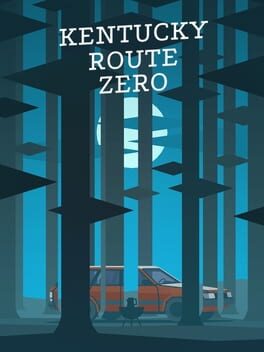Interactive fiction: it's probably the most misleading title of a video game genre, since there's hardly anything at all interactive about selecting between a handful of pre-written story tracks. In most cases, you can't experience a piece of interactive fiction differently than how you can experience a piece of traditional fiction, which is a disconnect that Kentucky Route Zero does its best to fix. For its entire runtime, the game is written in a way that's difficult to not at least respect. It doesn't attempt any cheap narrative gimmicks, it doesn't become explicitly meta at any point, and, most importantly, it never gives the player the impression that any decision made will alter the story's sequence of events. A lesser piece of interactive fiction would question whether or not decisions without at least the illusion of consequence are worth including, but Kentucky Route Zero has a polar opposite philosophy.
It's no coincidence that the game seems to have a fixation on museums, because in many ways, it is one. The museum itself is only there to house the exhibits and point you towards them- what you actually get out of the exhibits is entirely up to you. Kentucky Route Zero is a collection of experiences in the same way that a museum is a collection of exhibits, and, using this line of thinking, it's clear why it was divided into an act/scene structure. It also expands this stage play notation to the dialogue, where most of the choices have the player picking lines for characters to say. This is where the game's genius lies. If the majority of other interactive fiction games can be called "reading simulators" then Kentucky Route Zero is surely a "writing simulator." You can have characters explain their backstories or display their personalities in various different ways, and the only real motivation for what choice to make is what the most appropriate next line for the story would be. Just like looking at an exhibit in a museum, it's totally up to the player how exactly each story beat is experienced, and I think a lot of people will find themselves unable to rationalize why they made certain decisions, like withholding what could've been important information to have a character comment on something trivial. Clearly, one of the game's major goals was to make the audience as much of a participant as the author, and that's where it's most successful.
I found it fascinating from a logistical standpoint for its entire duration, but in terms of its actual contents, I only really felt hooked through Act I. I get that the events are supposed to be disjointed, I get that abstraction's the point here, and maybe the game's ultimately just not for me, but I really would've liked at least some concrete plot through-lines. The mystery of the Zero itself could've served this purpose, and maybe the game could've held off on the player actual visiting it until later on in the story, but perhaps I'm just being nearsighted. It's a museum, and that's an artistic choice that I greatly admire, but maybe it's a little too content in just being a museum. Overall, it's a deeply pretentious game, in a good way. It's confident that it's an important work, one that'll resonate with its audience enough to be remembered long after its contemporaries. And I hope it's right.
It's no coincidence that the game seems to have a fixation on museums, because in many ways, it is one. The museum itself is only there to house the exhibits and point you towards them- what you actually get out of the exhibits is entirely up to you. Kentucky Route Zero is a collection of experiences in the same way that a museum is a collection of exhibits, and, using this line of thinking, it's clear why it was divided into an act/scene structure. It also expands this stage play notation to the dialogue, where most of the choices have the player picking lines for characters to say. This is where the game's genius lies. If the majority of other interactive fiction games can be called "reading simulators" then Kentucky Route Zero is surely a "writing simulator." You can have characters explain their backstories or display their personalities in various different ways, and the only real motivation for what choice to make is what the most appropriate next line for the story would be. Just like looking at an exhibit in a museum, it's totally up to the player how exactly each story beat is experienced, and I think a lot of people will find themselves unable to rationalize why they made certain decisions, like withholding what could've been important information to have a character comment on something trivial. Clearly, one of the game's major goals was to make the audience as much of a participant as the author, and that's where it's most successful.
I found it fascinating from a logistical standpoint for its entire duration, but in terms of its actual contents, I only really felt hooked through Act I. I get that the events are supposed to be disjointed, I get that abstraction's the point here, and maybe the game's ultimately just not for me, but I really would've liked at least some concrete plot through-lines. The mystery of the Zero itself could've served this purpose, and maybe the game could've held off on the player actual visiting it until later on in the story, but perhaps I'm just being nearsighted. It's a museum, and that's an artistic choice that I greatly admire, but maybe it's a little too content in just being a museum. Overall, it's a deeply pretentious game, in a good way. It's confident that it's an important work, one that'll resonate with its audience enough to be remembered long after its contemporaries. And I hope it's right.
